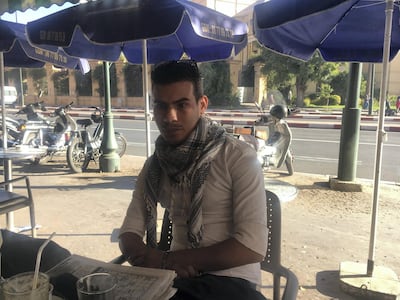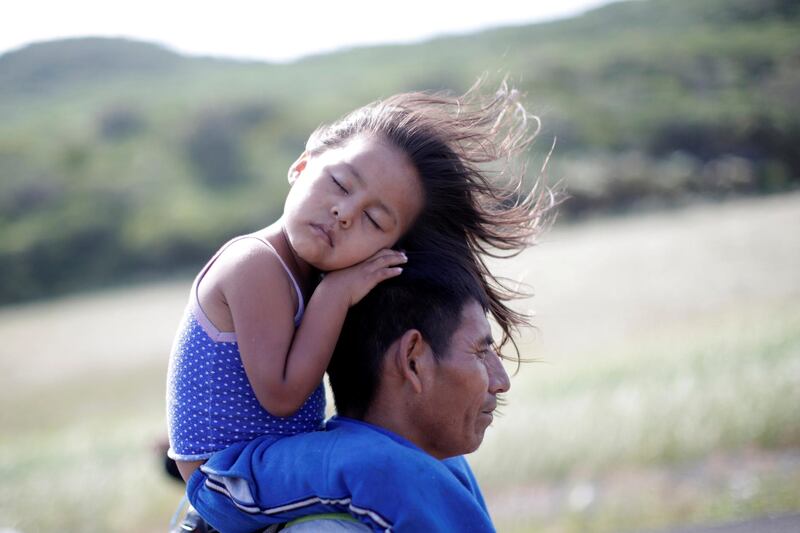Going into 2019, the world is at a social and moral crossroads. The past year has been one of mixed messages, with UN member states reaffirming the human rights of migrants with the UN Global Compact on Migration and recognising – for the first time – the role of climate change on mass displacement.
But 2018 has also been the year in which the policy debate on immigration intensified, often degenerating into a contest between globalists and nationalists that opened new rifts in institutions and societies alike.
A few blocks from the Marrakesh conference centre where heads of state met last month to adopt the milestone agreement on safe and orderly migration, Ahmad El Majdouli sat at a cafe and reminisced of the first time he spotted the Spanish enclave of Ceuta at the northern tip of Morocco.
“It was so close,” he said dreamily as he took a sip of a bitter, black coffee.
The 28-year-old was among those who stormed the border fence in an attempt to cross into Spain this summer, when Morocco became the new launchpad for African migrants after Libya cracked down on departures and Italy closed its ports.
Since an accident left his father unable to work a few years ago, Mr El Majdouli has struggled to provide for seven family members on a monthly salary of €250 (Dh1,050). “In Morocco, to find a better job you have to pay someone off and I can’t afford to do that,” he said.
His first attempt to cross the border was unsuccessful, but years of frustration at clientelism and economic deprivation have made him determined to try again.

In the eyes of international law, "those [commonly referred to as] economic migrants are actually human rights migrants – they are people who are moving because it's impossible to feed children or to realise a life of dignity of any kind", Craig Mokhiber, New York director of the Office of the UN Commissioner for Human Rights, told The National.
The Global Compact on Regular, Safe and Orderly Migration, announced at the intergovernmental conference in Marrakesh on December 10-11 in the presence of representatives of 164 of the 193 UN members states, is a landmark attempt to address a phenomenon that experts say will only become more widespread in the future. But this year has also seen a backlash against the values embodied in the non-binding agreement.
Italy's League party – which campaigned on a pledge to send 500,000 irregular migrants home – succeeded in forming a coalition government and blocking rescue missions in the Mediterranean Sea. The far-right AfD party in Germany and the populist Freedom Party in Austria also gained ground by keeping migration firmly at the top of the political agenda.
In the Czech Republic, President Milos Zeman’s forceful anti-immigrant stance contributed to his narrow victory over a liberal internationalist challenger, while the populist governments of Hungary and Poland cracked down on civil liberties and increasingly defined national identity in exclusionary ethnic and religious terms.
On the other side of the Atlantic, US President Donald Trump sent the army to deal with thousands of immigrants and refugees walking 4,000 kilometres across Central America to reach the US-Mexico border and encouraged the incarceration, deportation or exclusion of thousands of non-white people.
______________
Read more:
[ Rescued migrants head for Spain after Italy closes ports ]
[ First UN agreement on migration adopted in Morocco despite withdrawals ]
[ Migration compact backlash shows that myths are now more powerful than fact ]
______________
Backers of the Global Compact say that while populism may win elections, it will not help stem migration.
There were estimated 258 million migrants in the world in 2017, including people who move legally to take up jobs in other countries, and projections say this number will swell to a staggering 405 million by 2050 under the pressures of climate change.
While populist parties show little concern for this phenomenon or outright deny its existence, the link between climate change and migration has been formally established in the Global Compact.
As a response, humanitarian organisations and stakeholders have presented strategies to support communities affected by climate change. In South America, for instance, the Economic Commission for Latin America and the Caribbean is attempting to mitigate the impact on the agricultural sector by offering the 11 million people living in extreme poverty insurance to cover the costs of bad harvests.
Francesco Rocca, president of the International Federation of Red Cross and Red Crescent Societies, said such initiatives must be coupled with ways to ensure that migration can be regulated and safe. “We need to stop putting people in front of two equally unacceptable decisions: staying in a place where famine, violence, food insecurity and climate change will put their lives at risk or escape from their countries risking to be trafficked, to become slaves or to die in their journey,” he said.
Economists also praised the benefits of regular migration, which they said generates in remittances three times the wealth of humanitarian aid.
But whether the 23 objectives of the Global Compact, the appeals for humane treatment of migrants and the economic rationale will prevail over the challenges of integration and the “gut politics” of populist parties advocating for building walls and closing ports, remains to be seen.
In Marrakesh, a 40-year-old who gave his name as Abdullah said he spent years as a regular migrant in a small German town but that growing discrimination after the 9/11 attacks led him to return to Morocco.
Now, he hopes the trading business with Germany that he set up upon his return will keep thriving and he will never again be forced to emigrate. “I had everything in Germany,” he said. “But only at home can you truly be yourself.”






